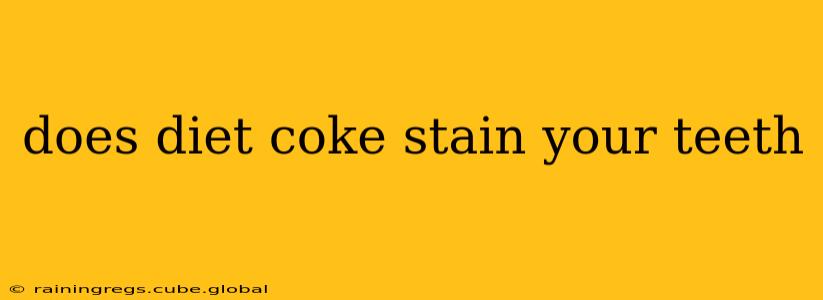The question of whether Diet Coke stains teeth is a common one, and the answer isn't a simple yes or no. While Diet Coke doesn't contain the sugars that contribute to cavities, it still contains acids and other substances that can affect your enamel and potentially lead to staining. This article will delve into the details, exploring the science behind the potential staining and offering practical advice to protect your pearly whites.
What Causes Teeth Staining?
Before we focus specifically on Diet Coke, let's understand the primary culprits behind tooth discoloration. The main causes include:
- Chromogenic substances: These are colored compounds found in many foods and drinks, including coffee, tea, red wine, and yes, even dark sodas like Diet Coke. These substances can bind to the enamel, causing discoloration over time.
- Acidity: The acidic nature of many beverages, including Diet Coke, can erode tooth enamel. This erosion makes teeth more porous and susceptible to staining from chromogenic substances. The weakened enamel is also more vulnerable to other forms of damage.
- Poor oral hygiene: Failing to brush and floss regularly allows plaque and bacteria to accumulate on your teeth. This can lead to staining and other dental problems.
Does Diet Coke Stain Teeth More Than Regular Coke?
This is a crucial distinction. While both regular and Diet Coke contain chromogenic substances and acids that contribute to staining, regular Coke's high sugar content exacerbates the problem. Sugar feeds bacteria, leading to increased acid production, further eroding enamel and making staining more likely. Therefore, while Diet Coke can stain teeth, it might be less likely to stain them as severely as regular Coke due to the absence of sugar.
How Does the Acidity of Diet Coke Affect Teeth?
Diet Coke's acidity weakens the enamel, making it more permeable to staining agents. This doesn't necessarily mean your teeth will immediately turn brown, but prolonged and frequent consumption can lead to gradual discoloration and increased sensitivity. The enamel erosion can also make teeth more susceptible to cavities later on, even without the presence of sugar.
Can Diet Coke Cause Other Dental Problems?
Beyond staining, the acidity in Diet Coke can contribute to:
- Enamel erosion: This is the gradual wearing away of the protective outer layer of your teeth.
- Tooth sensitivity: As enamel erodes, the underlying dentin becomes exposed, leading to increased sensitivity to hot and cold temperatures.
- Increased risk of cavities: Although Diet Coke lacks sugar, the acidic environment can weaken enamel and create conditions where bacteria can more easily thrive, potentially leading to cavities.
How Can I Protect My Teeth from Diet Coke Staining?
While eliminating Diet Coke entirely is the surest way to prevent staining and enamel erosion, here are some strategies to minimize the impact:
- Limit consumption: Moderation is key. The less Diet Coke you drink, the lower your risk of staining and enamel erosion.
- Drink through a straw: This minimizes contact between the drink and your teeth.
- Rinse your mouth with water: After consuming Diet Coke, rinse your mouth with plain water to help neutralize the acids.
- Brush and floss regularly: Maintain a consistent oral hygiene routine to remove plaque and food particles.
- Visit your dentist regularly: Regular checkups and professional cleanings can help detect and address any dental problems early on.
What are some alternatives to Diet Coke that are less damaging to teeth?
Consider switching to water, unsweetened tea, or milk. These alternatives are significantly less acidic and do not contain the chromogenic substances found in dark sodas.
By understanding the impact of Diet Coke and other acidic drinks on your teeth and adopting preventative measures, you can significantly reduce the risk of staining and maintain a healthy, bright smile. Remember, consulting a dentist is always recommended for personalized advice on maintaining optimal oral health.
